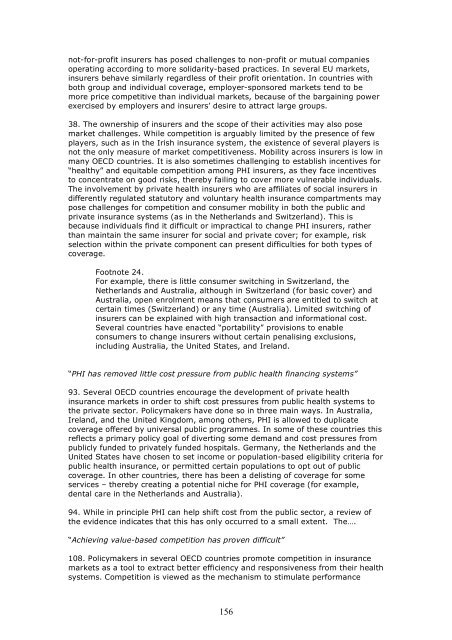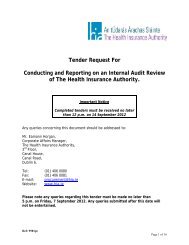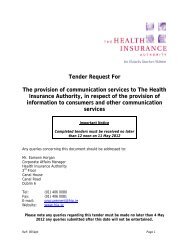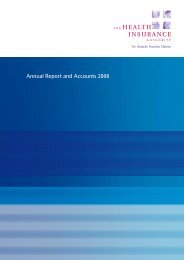Competition in the Irish Private Health Insurance Market
Competition in the Irish Private Health Insurance Market
Competition in the Irish Private Health Insurance Market
Create successful ePaper yourself
Turn your PDF publications into a flip-book with our unique Google optimized e-Paper software.
not-for-profit <strong>in</strong>surers has posed challenges to non-profit or mutual companies<br />
operat<strong>in</strong>g accord<strong>in</strong>g to more solidarity-based practices. In several EU markets,<br />
<strong>in</strong>surers behave similarly regardless of <strong>the</strong>ir profit orientation. In countries with<br />
both group and <strong>in</strong>dividual coverage, employer-sponsored markets tend to be<br />
more price competitive than <strong>in</strong>dividual markets, because of <strong>the</strong> barga<strong>in</strong><strong>in</strong>g power<br />
exercised by employers and <strong>in</strong>surers’ desire to attract large groups.<br />
38. The ownership of <strong>in</strong>surers and <strong>the</strong> scope of <strong>the</strong>ir activities may also pose<br />
market challenges. While competition is arguably limited by <strong>the</strong> presence of few<br />
players, such as <strong>in</strong> <strong>the</strong> <strong>Irish</strong> <strong>in</strong>surance system, <strong>the</strong> existence of several players is<br />
not <strong>the</strong> only measure of market competitiveness. Mobility across <strong>in</strong>surers is low <strong>in</strong><br />
many OECD countries. It is also sometimes challeng<strong>in</strong>g to establish <strong>in</strong>centives for<br />
“healthy” and equitable competition among PHI <strong>in</strong>surers, as <strong>the</strong>y face <strong>in</strong>centives<br />
to concentrate on good risks, <strong>the</strong>reby fail<strong>in</strong>g to cover more vulnerable <strong>in</strong>dividuals.<br />
The <strong>in</strong>volvement by private health <strong>in</strong>surers who are affiliates of social <strong>in</strong>surers <strong>in</strong><br />
differently regulated statutory and voluntary health <strong>in</strong>surance compartments may<br />
pose challenges for competition and consumer mobility <strong>in</strong> both <strong>the</strong> public and<br />
private <strong>in</strong>surance systems (as <strong>in</strong> <strong>the</strong> Ne<strong>the</strong>rlands and Switzerland). This is<br />
because <strong>in</strong>dividuals f<strong>in</strong>d it difficult or impractical to change PHI <strong>in</strong>surers, ra<strong>the</strong>r<br />
than ma<strong>in</strong>ta<strong>in</strong> <strong>the</strong> same <strong>in</strong>surer for social and private cover; for example, risk<br />
selection with<strong>in</strong> <strong>the</strong> private component can present difficulties for both types of<br />
coverage.<br />
Footnote 24.<br />
For example, <strong>the</strong>re is little consumer switch<strong>in</strong>g <strong>in</strong> Switzerland, <strong>the</strong><br />
Ne<strong>the</strong>rlands and Australia, although <strong>in</strong> Switzerland (for basic cover) and<br />
Australia, open enrolment means that consumers are entitled to switch at<br />
certa<strong>in</strong> times (Switzerland) or any time (Australia). Limited switch<strong>in</strong>g of<br />
<strong>in</strong>surers can be expla<strong>in</strong>ed with high transaction and <strong>in</strong>formational cost.<br />
Several countries have enacted “portability” provisions to enable<br />
consumers to change <strong>in</strong>surers without certa<strong>in</strong> penalis<strong>in</strong>g exclusions,<br />
<strong>in</strong>clud<strong>in</strong>g Australia, <strong>the</strong> United States, and Ireland.<br />
“PHI has removed little cost pressure from public health f<strong>in</strong>anc<strong>in</strong>g systems”<br />
93. Several OECD countries encourage <strong>the</strong> development of private health<br />
<strong>in</strong>surance markets <strong>in</strong> order to shift cost pressures from public health systems to<br />
<strong>the</strong> private sector. Policymakers have done so <strong>in</strong> three ma<strong>in</strong> ways. In Australia,<br />
Ireland, and <strong>the</strong> United K<strong>in</strong>gdom, among o<strong>the</strong>rs, PHI is allowed to duplicate<br />
coverage offered by universal public programmes. In some of <strong>the</strong>se countries this<br />
reflects a primary policy goal of divert<strong>in</strong>g some demand and cost pressures from<br />
publicly funded to privately funded hospitals. Germany, <strong>the</strong> Ne<strong>the</strong>rlands and <strong>the</strong><br />
United States have chosen to set <strong>in</strong>come or population-based eligibility criteria for<br />
public health <strong>in</strong>surance, or permitted certa<strong>in</strong> populations to opt out of public<br />
coverage. In o<strong>the</strong>r countries, <strong>the</strong>re has been a delist<strong>in</strong>g of coverage for some<br />
services – <strong>the</strong>reby creat<strong>in</strong>g a potential niche for PHI coverage (for example,<br />
dental care <strong>in</strong> <strong>the</strong> Ne<strong>the</strong>rlands and Australia).<br />
94. While <strong>in</strong> pr<strong>in</strong>ciple PHI can help shift cost from <strong>the</strong> public sector, a review of<br />
<strong>the</strong> evidence <strong>in</strong>dicates that this has only occurred to a small extent. The….<br />
“Achiev<strong>in</strong>g value-based competition has proven difficult”<br />
108. Policymakers <strong>in</strong> several OECD countries promote competition <strong>in</strong> <strong>in</strong>surance<br />
markets as a tool to extract better efficiency and responsiveness from <strong>the</strong>ir health<br />
systems. <strong>Competition</strong> is viewed as <strong>the</strong> mechanism to stimulate performance<br />
156







